Na tem mestu predstavljamo vse, kar ste kadarkoli želeli vedeti o kolagenu, njegovi koristnosti in uporabi. Izvedeli boste veliko zanimivih dejstev, uporabili pa boste lahko celo kalkulator in ugotovili ali to beljakovino dejansko potrebujete.
VSEBINA: Kaj je kolagen? | KALKULATOR | Tipi kolagena | Posledice zmanjšane proizvodnje kolagena | Pridobivanje kolagena | 6 prednosti uporabe | Znanstvene študije o kolagenu | Vprašanja in odgovori | Viri/reference
V zadnjem času se vedno več govori o kolagenu. Le stežka obiščete drogerijo ali bolje založeno trgovino, da nekje ne bi opazili dodatkov kolagena v prahu ali tekočini. Vedno več je tudi kozmetičnih izdelkov, ki na veliko oglašujejo, da vsebujejo kolagen.
Popularen izbor:
 |
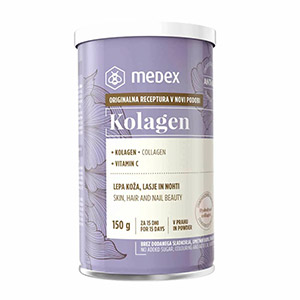 |
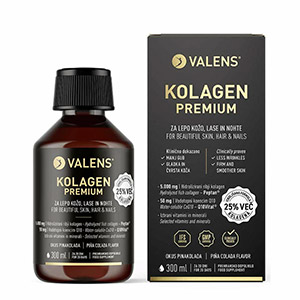 |
| Kolagen Shot | Medex kolagen | Valens kolagen |
Vendar kaj kolagen sploh je in kakšen je njegov doprinos vašemu zdravju ter najbolj pomembno - kateri kolagen sploh izbrati? Poznamo kar 16 različnih tipov kolagena. Najdemo ga v številnih telesnih tkivih, njegova vloga pa je izrednega pomena, saj daje podporo in strukturo. Nadomeščanje te pomembne molekule je izrednega pomena.
Osnovne informacije o kolagenu
- kolagen je ena izmed najbolj zastopanih beljakovinskih molekul, ki se nahaja v človeškem organizmu. Je velika beljakovinska makromolekula, sestavljena iz osnovnih gradnikov, ki jim pravimo aminokisline.
- je organska velemolekula, ki jo je mogoče pridobiti iz vsaj 5 različnih virov
- je molekula, katere proizvodnja se tekom staranja človeka konstantno zmanjšuje.
- je sestavni del žilnega sistema, pa tudi kosti, dlesni, zob - širše pa je zastopana predvsem v koži.
Nadomeščanje kolagena je torej izrednega pomena, zato je njegovo nadomeščanje v času, ko kolagena primanjkuje še kako pomembno - izberite ustrezen proizvod na sledeči povezavi:
Poseben izbor vrhunskih kolagenov je na voljo na sledeči povezavi: vrhunski kolagen
Slika: zgornja slika nakazuje kritične dele, kje vse je kolagen potreben in nepogrešljiv. Redno nadomeščanje kolagena in vzpodbujanje njegove proizvodnje je posledično ključnega pomena.

Podporni članki, povezani s kolagenom:
Verjetno je vaša prva asociacija ob besedi kolagen, koža oziroma mladosten izgled. Prav v povezavi z anti-age rituali se kolagen označuje za neverjeten element, ki ima vidne učinke. Vendar pa je kolagen veliko več kot to.Če bi se radi poučili o kolagenu, izvedeli več o njegovih pozitivnih učinkih, spoznali različne oblike kolagena in pridobili informacije, da boste izbrali pravo obliko, berite dalje.Kaj je kolagen?
Kolagen je družina zunajceličnih molekul. Kolagen je najbolj zastopana beljakovina v vašem telesu. Ima številne različne vloge, med drugim vaši koži zagotavlja strukturo in ob tem pomaga tudi pri strjevanju krvi. Predstavlja glavno sestavino vezivnega tkiva v različnih delih telesa. Kolagen je v zadnjih letih vedno bolj priljubljen kot prehransko dopolnilo, najdemo pa ga lahko tudi v nekaterih izdelkih za nego telesa in las.
Predstavljamo vam nekaj dejstev o kolagenu, da boste lažje našli odgovor na vsa vprašanja, ki se vam porajajo o tej izredno pomembni beljakovini.
Slika: izgled molekul kolagena pod visoko povečavo. Slika je posneta z elektronskim mikroskopom (SEM), slika kolagena jasno prikazuje pasasti vzorec, ki je značilen za kolagen.
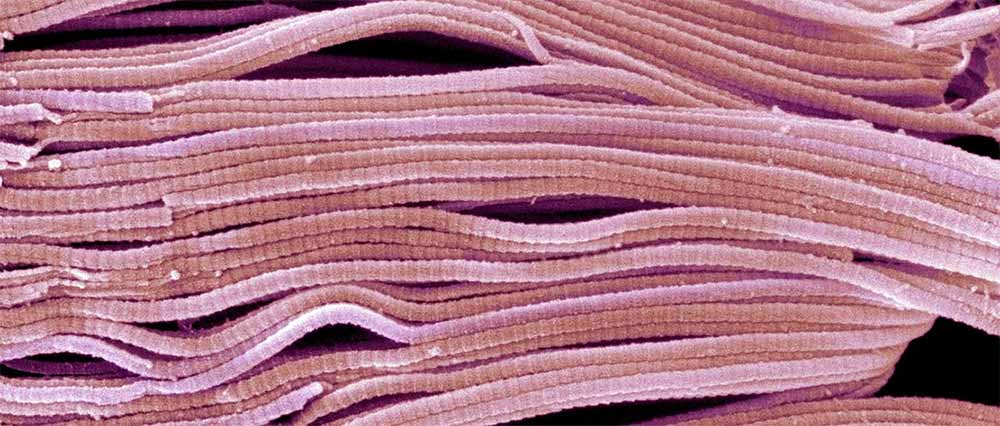
Kolagen je kot beljakovina eden glavnih gradnikov vaših kosti, kože, mišic in kit ter vezi. Prisoten je v mnogih delih telesa, kjer ima pomembno vlogo, najdemo ga med drugim, tudi v krvnih žilah, roženicah in tudi v zobeh.Naše telo lahko kolagen proizvaja samostojno, dodatki s kolagenom pa pri tem še pomagajo. Pravzaprav, bi lahko kolagen razumeli kot posebno lepilo, ki poskrbi, da se vse lepo drži skupaj. Na to namiguje tudi poimenovanje.
Kalkulator kolagena
Ta kalkulator kolagena oz. proteinov je odlično orodje za vse, ki jih zanima uravnotežena prehrana in njen vpliv na naše zdravje. Z njegovo pomočjo boste lahko izračunali optimalni vnos kolagena oziroma proteinov nasploh za vašo težo.
Beseda kolagen namreč izhaja iz grške besede »kólla«, ki pomeni lepilo. Sedaj lažje razumemo, zakaj je kolagen torej pomemben za strukturo večine telesa, vključno s kožo, kostmi, kitami ter ligamenti.

V nadaljevanju, vam predstavljamo štiri glavne vrste kolagena, ki predstavljajo od 80 do 90 % celotnega kolagena v telesu. Sicer pa obstaja vsaj 16 vrst kolagena, ki se pojavljajo v našem telesu. Se sprašujete kakšno vlogo ima posamezen tip kolagena?
Tipi kolagena
Obstajajo 4 tipi kolagena:
- Tip 1: predstavlja kar veliko večino kolagena v vašem telesu. Takšen kolagen ima gosta vlakna in zagotavlja predvsem strukturo kože, kosti, kit, hrustanca, vezivnega tkiva ter zob in ima zelo pomembno vlogo pri »anti-age« ritualih.
- Tip 2: - je tip kolagena, ki ga definirajo bolj ohlapna vlakna. Zato ga najdemo predvsem v elastičnem hrustancu, ki pomaga blažiti vaše sklepe.
- Tip 3: - podpira predvsem strukturo mišic, organov ter žil.
- Tip 4: - je tip kolagena, ki sodeluje pri filtraciji in se nahaja v posameznih plasteh kože.
Slika: na sliki so prikazani trije tipi kolagena (Tip-I do III kolagen).

Ostali tipi kolagena so manj prisotni v telesu, a zato nič manj pomembni. Skupno kolagenu pa je, da ga ima naše telo s starostjo vedno manj in hkrati izgublja tudi na kakovosti.
Ta upad je povsem normalen po dopolnjenem 60. letu. Po nekaterih podatkih naj bi telo že po 25. letu vsako leto proizvedlo kar za 1,5% manj kolagena. Pri ženskah pa se naravna sinteza zmanjša po obdobju menopavze.
Da smo že vstopili v leta, ko se tvori manj kolagena, lahko opazimo predvsem na koži, ki zaradi slabše kakovosti in manjše prisotnosti kolagena, postane manj čvrsta ter prožna. Pomanjkanje kolagena v telesu lahko opazite tudi kot upadlo kožo na obrazu ter ostalih predelih telesa, kot je zadnjica in trebuh. Zaradi pomanjkanja kolagena pa s starostjo slabi tudi hrustanec.
Video: Spodnji video prikaz govori o več različnih kolagenskih tipih:

Pomanjkanje kolagena je vidno tudi na laseh, ki lahko pričnejo prav zaradi pomanjkanja še bolj izpadati. Prav tako pa postanejo bolj krhki in suhi. Lasje so namreč kar v 90% sestavljeni iz aminokislin. Tudi nohti lahko postanejo tanki in lomljivi zaradi pomanjkanja. Zaradi izropanih zalog kolagena, lahko pride tudi do hormonskega neravnovesja.Hranila, ki povečajo proizvodnjo kolagenaKolagen se najprej pojavi kot prokolagen. Tega naše telo spretno tvori s kombinacijo dveh zelo pomembnih aminokislin, glicina ter prolina. V tem postopku telo porablja tudi vitamin C.
Mogoče je, da boste telesu posredno pomagali pri proizvodnji pomembnih beljakovin tako, da boste v telo vnesli več dobrih hranil kot so: vitamin C, prolin, glicin, baker. S svojimi prehrambnimi navadami torej lahko vplivate tudi na to, kolikšno količino kolagena, bo lahko vaše telo samostojno ustvarilo oziroma sintetiziralo. Predvsem je to odvisno od količine zaužitih živil, ki so bogat vir aminokislin, za katere že veste, da so ključni gradniki kolagena.
Vitamin C
Vitamin C je zelo pomemben vitamin za naše telo. Naravno pa je prisoten predvsem v citrusih, papriki in jagodah. Proline lahko naravno vnesete v telo z jajčnimi beljaki, pšeničnimi kalčki in mlečnimi izdelki. Prisoten pa je tudi v špargljih, zelju ter gobah. Velike količine glicina najdemo predvsem v svinjski in kokošji koži, želatini ter različnih živilih, ki so bogati z beljakovinami.
Slika: C vitamin ali askorbinska kislina je za proizvodnjo kolagena izrednega pomena.
Baker
Baker lahko v telo vnesete s pomočjo mesa iz organov, sezamovimi semeni, kakavom v prahu in indijskimi oreščki ter lečo.Vaše telo pa ob teh hranilih potrebuje tudi zelo visoko kakovostne beljakovine, ki vsebujejo aminokisline, potrebne za tvorbo novih beljakovin. Mislimo predvsem na meso, perutnino, morske sadeže, mlečne izdelke ter stročnice in tofu.
Kljub zgoraj naštetim živilom, se morate tako kot pri ostalih ciljih, tudi pri povečanem vnosu kolagena v telo, držati prvega pravila prehrane. Trudite se, da bo vaš jedilnik kar se da raznolik in seveda uravnotežen in da boste pri tem sledili načelom zdrave prehrane. Tako boste brez težav prispevali k boljši zalogi kolagena v telesu.
Organizmu boste namreč nudili pravi material, da bo sploh lahko oblikoval kolagen. Seveda pa ne bo škodilo, če urejeni prehrani dodate živila, ki bodo organizmu še dodatno prispevali potrebne gradnike, ki so nujni za nastanek kolagena.
Video predstavitev: oglejte si 5 preprostih načinov, kako pridobiti več kolagena iz hrane ter kako poskrbeti, da bo biološka aktivnost takšnega kolagena kar se da največja.

Kaj škoduje kolagenu?Kolagenu, kot zelo pomembni beljakovini v našem telesu, lahko marsikaj tudi škoduje. Kot smo torej ugotovili, je kolagen pravzaprav beljakovina. Kompleksna organska molekula kot je beljakovina, lahko razpade, kar je za naše telo in zaloge kolagena izredno neugoden proces. Na to, da te molekule pričnejo razpadati, pa vpliva veliko različnih dejavnikov, ki jih lahko sami brez težav omejite.
- Škodi predvsem uživanje določenih živil, kot so prevelike količine sladkorja ter rafiniranih ogljikovih hidratov. Sladkor ima namreč posebno moč, ki intenzivno ovira sposobnost kolagena, da se obnavlja. Svetujemo vam, da se izognete pretiranem uživanju dodanega sladkorja ter rafiniranih ogljikovih hidratov.
- Kolagenu škoduje tudi prevelika količina sonca, saj lahko ultravijolično sevanje zmanjša nastajanje kolagena. Svetujemo vam, da se izognete pretirani izpostavljenosti soncu.
- Tudi kajenje je lahko škodljivo. Vpliva predvsem na proizvodnjo kolagena. Kajenje pa seveda vpliva tudi na hitro vidno staranje, ki si ga ne želimo. S premalo spanca lahko prav tako načnete zaloge kolagena. Tudi stres mu škoduje. K pomanjkanju lahko pripomore tudi premalo vitamina C v krvi ter premalo cinka ter koristnih antioksidantov.
- Na kolagen pa slabo vplivajo tudi nekatere avtoimunske motnje, kot recimo lupus in podobne. Takšne motnje poškodujejo kolagen, kar se odraža na različnih predelih našega telesa. Da bi se temu izognili, se prepričajte, da je vaš življenjski slog res dober za vas in se izogibate stvarem, ki lahko škodijo kolagenu.

Kolagenu pa ne škodujejo zgolj zgorasj našteti dejanviki, količina kolagena se počasi zmanjšuje tudi s staranjem.
Graf: graf spodaj prikazuje odvisnost zastopanosti kolagena v človeškem telesu v odvisnosti od starosti osebe.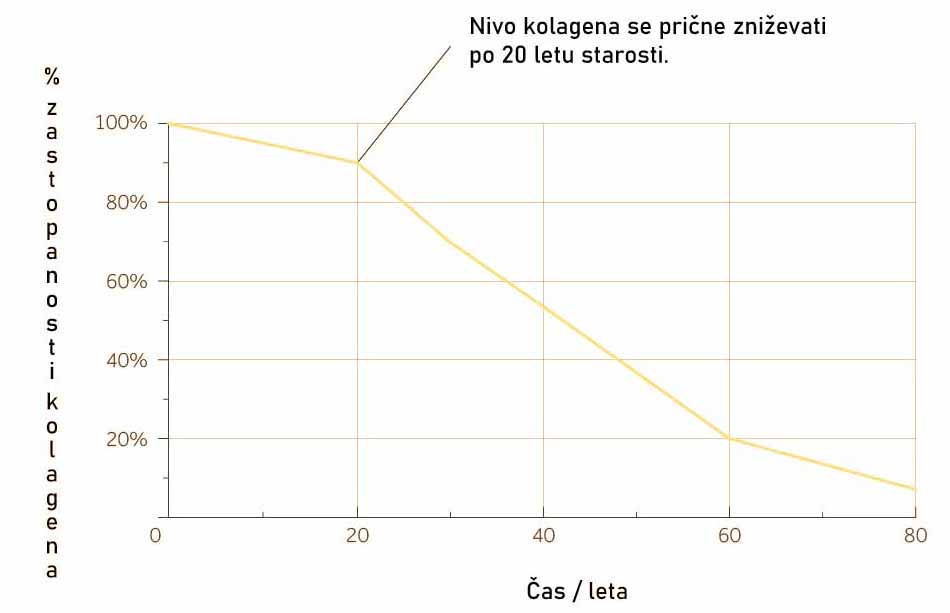 (Vir: https://eu.absolutecollagen.com)
(Vir: https://eu.absolutecollagen.com)
V mladosti je zastopanost te pomembne beljakovine največja - to pomeni, da se proizvede večja količina kolagena, kot se ga razgradi. V času zrelosti se količina kolagena, ki se proizvede uravna s količino kolagena, ki se ob enem razgradi.
V času starosti - predvsem pa po 50 letu pa je razgradnja kolagena iz leta v leto večja, proizvodnja kolagena pa ne narašča. Če kolagena ne dodajamo v organizem s prehrano ali s prehranskimi dopolnili, se celokupna količina kolagena zmanjšuje.Kaj se dogaja s kolagenom, ko se staramo?
Ta vele-organska molekula predstavlja kar 70 % suhe teže kožnega tkiva (https://vibrancemedspa.com/what-happens-to-collagen-as-we-age/). Kožo učvrščuje, izbolša njeno elastičnost v kombinaciji z elastinsko molekulo, ki je prav tako prisotna v podkožju.
Vlakna kolagena tako tvorijo 3D mrežno strukturo, kamor se ujame elastin in hialuronska kislina - obe molekuli, ki se ujameta v to 3D strukturo skrbita, da je koža navzven na otip prijetno elastična in globinsko navlažena.
S staranjem je produkcija kolagena vse manjša in manjša - koža se zaradi tega vidno stanjša, postane bolj suha in ob enem tudi manj elastična. Posledica je izguba kolagena zaslužna za nastajanje gubic, za katere pogosto pravimo, da so prvi pokazatelj staranja.
Slika: prikaz nastanka gubic, kar je posledica zmanjšane proizvodje kolagena

Posledice zmanjšane proizvodnje kolagena
Zmanjšana proizvodnja kolagena ne kaže le posledic na obrazu, pač pa se njegovo pomanjkanje odraža tudi na drugih področjih:
- Kosti: zaradi upada vsebnosti te pomembne organske molekule kostno tkivo postane bolj lomljivo in predvsem manj trpežno.
- Sklepi: sklepni hrustanec se žal ne obnavlja, preostali hrustanec pa se obrabi zaradi degenerativnih procesov ali prekomerne obremenitve.
- Mišice: posledica izgube kolagena je zmanjšana mobilnost in funkcija mišičnega tkiva.
Žal pa se pomanjkanje kolagena odraža še na sledečih področjih:
- Zmanjšana polnost kontur - predvsem na področju pod očmi se v primeru pomanjanja kolagena izrazijo vdolbinice, ki nakazujejo na zmanjšano proizvodnjo kolagena.
- Boleči sklepi - posledica pomanjkanja kolagena v področju sklepov povzroči pospešeno obrabo hrustanca, posledica so vse pogostejše bolečine v tem področju.
- Povešena koža - je posledica zmanjšane polnosti kože, pomanjkanja kolagenske 3D strukture. Odvečna koža se izrazi predvsem na področju trebuha, obraznih kosti (ličnice in čeljustna kost) in zadnjice.
- Izgled las - izguba volnosti las, debeline je samo nekaj vidnih posledic zmanjšane porizvodnje kolagena. Zelo pogosto se lasje tudi cepijo.
- Telesna teža - zmanjšana proizvodnja pogosto rezultira tudi v upošasnitvi metabolizma, posledica je višanje telesne teže.
- Problemi z zobmi - premalo kolagena povzroča majavost ali celo izpadanje zob - problem je opisan s pojmom skorbut, ki je posledica zmanjšane vsebnosti kolagena v tkivu dlesni.
- Zmanjšana čvrstost žilnih sten - posledica zmanjšane čvrstosti krvnih žil so lahko sledeče in predvsem neprijetne težave: suhost oči, glavoboli, problemi z dihanjem in kožni ekcemi.
Posledice zmanjšane proizvodnje kolagena vključujejo izgubo elastičnosti kože, kar vodi do nastanka gub in povešene kože, počasnejše celjenje ran, večjo nagnjenost k poškodbam kože, kot so modrice in razpoke, zmanjšano gostoto kosti, kar povečuje tveganje za osteoporozo, oslabitev sklepov in vezi, kar lahko povzroči bolečine in zmanjšano gibljivost, ter redčenje in lomljenje las ter nohtov.
Pridobivanje kolagena
V nadaljevanju si bomo pogledali, na katere vse načine lahko pridobivamo kolagen.Naravni viri kolagenaKolagen lahko zaužijete tudi z nekaterimi naravnimi viri. Veliko kolagena se nahaja v vezivnem tkivu hrane živalskega izvora. Lahko ga najdemo v piščančji in svinjski kož, govedini in ribah. Zelo bogat vir kolagena je tudi kostna juha, ki nastane pri kuhanju kosti piščanca ali drugih živali.
Skuhan kolagen poznamo v obliki želatine. Vsebuje veliko aminokislin, ki so nujno potrebne za proizvodnjo kolagena.Kolagensko bogata živila so predvsem:
- piščančje meso
- ribe
- jajca
- citrusi
- jagodičevje
- česen
- fižol
- indijski oreščki
Video: Video spodaj prikazuje različna hranila, ki so obogatena s kolagenom.

Še vedno obstajajo ugibanja, ali uživanje hrane, ki je bogata s kolagenom, dejansko prispeva k povečanju ravni te zelo pomembne beljakovine v telesu. Ali hrana, ki je bogata s kolagenom dejansko prispeva k povečanju količine v telesu še ni raziskano.
Prav tako pa še niso izvedene študije, ki bi primerjale učinek prehranskih dopolnil s kolagenom ter živil bogatih s kolagenom.Z uživanjem živil, ki so bogata z beljakovinami, omogočite, da se s pomočjo prebavnih encimov, razgradijo na aminokisline iz katerih lahko nato ponovno nastane kolagen. Na drugi strani imamo kolagen v prehranskih dopolnilih, ki je že razgrajen ali hidroliziran, kar naj bi pripomoglo k hitrejši absorpciji.
Kolagenski dodatkiKolagenski dodatki so na voljo v različnih formulacijah in so pridobljeni iz različnih virov. Kolagen je kot dopolnilo na voljo v različnih oblikah kot so prašek, tablete ali v tekočini. Po prehranskih dodatkih s kolagenom posega vedno več ljudi, predvsem ženske, ko opazijo prve znake staranja in ob dobrih učinkih za njegovo uživanje navdušijo tudi moške.
Najpogosteje gre pri dodatkih za kolagen, ki je pridobljen iz živalskih virov, predvsem prašičev, rib in krav. Običajno govorimo o ribjem oziroma morskem kolagenu, govejem kolagenu ter tudi jajčnem kolagenu v dodatkih. Da se prekrije osnoven okus in vonj kolagena, se kolagenskim dodatkom dodajo posebne arome, sladila in okusi, da je kolagen kot prehransko dopolnilo res dober za uživanje.
Sestave dodatkov se med seboj sicer razlikujejo, vendar večinoma prav vsi vsebujejo kombinacijo kolagenov tipa I, II, III ali pa posamezen tip kolagena. Uporabniki pa pogosto niso pozorni na samo sestavo dopolnila temveč na obliko kolagenskega dodatka.
Izberete lahko obliko kolagen peptidov, ki je na voljo v prahu in ga je zelo enostavno vključiti v živila. Ta oblika kolagena se ne želira in jo lahko zato brez težav vmešate v napitke, juhe ali peciva in s tem ne vplivate na teksturo jedi. Želatino lahko dodate in vključite v pripravo domačih želejev in gumijev. Na spletu je na voljo mnogo receptov, ki želatino odlično vključujejo v nekatere jedi.
Med uporabniki je najbolj pogost hidroliziran kolagen. Gre za kolagen, ki je s pomočjo posebne inovativne metode razdeljen na manjše delce. Ti delci so pravzaprav peptidi, ki omogočajo, da se kolagen veliko lažje absorbira, kot če bi bili ti delci veliki. V primerjavi z živili, ki so bogata s kolagenom, se lahko hidroliziran kolagen absorbira kar do trikrat bolje. Hidroliziran kolagen je priljubljen tudi zato, ker ga lahko preprosto vmešate v napitke, smutije, juhe in omake, sploh če so brez dodanih okusov. Lahko pa tudi odlično dopolnijo okus ostalih živil.
Slika: kolagen v obliki želatine težje prehaja v organizem, saj se le deloma razgradi na aminokisline.

Poznamo pa tudi kolagen v surovi oziroma nedenaturirani obliki. V tej obliki ostanejo beljakovine kolagena popolnoma nedotaknjene in nespremenjene.V procesu prebave, se vse oblike kolagena razgradijo na aminokisline. Te se nato absorbirajo in se lahko uporabijo za izgradnjo kolagena ali drugih beljakovin, ki so nujno potrebne za vaše telo. V zadnjem času sta na policah trgovin najbolj pogosti dve obliki kolagena – hidroliziran kolagen in želatina. Kateri vam bo bolj všeč, se morate seveda odločiti sami.
Prednosti kolagenskih dodatkovVedno priljubljenejši postajajo kolagenski dodatki. Z njimi lahko namreč na preprost in okusen način v telo vnesemo kolagen.Kolagenski dodatki, so na voljo v različnih formulacijah, kar vsakemu posamezniku omogoči, da izbere izdelek, ki mu najbolj ustreza. Prav tako lahko izbirate tudi med prehranskimi dodatki s kolagenom, ki imajo različno močne koncentracije kolagena. Dodatna možnost izbire pa so dodatki, ki imajo dodane različne okuse in je lahko dnevni odmerek kolagena pravzaprav vaš dnevni posladek.
Čeprav ne obstaja mnogo študiji o dodatkih kolagena, obstoječe kažejo na koristi kolagena na različnih področjih. Ker na veliko procesov in stanj v telesu vplivajo tudi drugi dejavniki in hranila, ne zgolj kolagen, je težko določiti kaj pravzaprav so zasluge kolagenskih dodatkov. S študijami, ki jih predstavljamo v nadaljevanju, so ugotovili, da posamezni odmerki dodanega kolagena dnevno, v daljšem časovnem obdobju dejansko prispevajo k razliki.Pozitivni učinkiPreverjeni so nekateri učinki kolagena na posamezne predele telesa.
Kot smo že napisali, je kolagen glavna sestavina vaše kože. Pomembno vlogo ima pri krepitvi kože, hkrati pa lahko prispeva k boljši elastičnosti ter hidraciji. Kolagen se namreč nahaja v dermisu oziroma srednjem sloju kože. Tam pomaga oblikovati vlaknato mrežo celic, ki ji rečemo fibroplasti. Kolagen ima pomembno vlogo tudi pri nadomeščanju ter obnavljanju odmrlih kožnih celic.
S tem ko se staramo, se znatno poslabša koncentracija kolagena. To pa lahko privede do suhe kože in postopnega nastajanja gub. Pričnejo se pojavljati okoli oči potem pa se vsidrajo tudi okoli ust in na licih. Zato vsem, ki se borijo s prvimi znaki staranja, priporočamo uživanje kolagena. Študije so namreč pokazale, da lahko dodajanje kolagena upočasni vidno staranje z zmanjšanjem gub in suhosti.
Slika: prikazuje uspešnost regeneracije in proizvodnje kolagena.
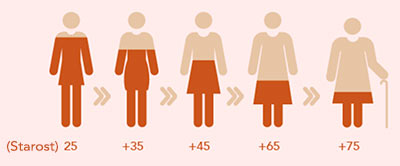
Produkcija te pomembne organske molekule se s staranjem vidno zmanjšuje.V študiji, kjer so ženske osem tednov uživale dodatek, ki je vseboval od 2,5 do 5 gramov kolagena, so ugotovili, da je koža manj suha in se je izboljšala prožnost v primerjavi s tistimi, ki dodatka niso jemale. Z drugo študijo so pokazali, da se je pri ženska, ki so 12 tednov uživale pijačo z dodatkom kolagena, izboljšala hidracija kože in da se je zmanjšala globina gub, glede na kožo tistih v kontrolni skupini. V študiji so leta 2019 ugotovili, da ženske, ki uživajo dodatek s kolagenom, uživajo v bolj elastični koži. Kolagen se namreč uporablja tudi pri aktualnih tretmajih, ki izboljšajo videt kože s pomočjo zmanjšanja gub.
Nekateri pa se poslužujejo tudi uporabe injekcij s kolagenom. Polnila, ki so bogata s kolagenom, se uporabljajo v kozmetičnih salonih, za zmanjševanje vidnosti prvih gub in linij iz obraza. Polnila se lahko uporabljajo tudi za izboljšanje videza brazgotin.Pojavljajo se tudi številne anekdote in izpovedi uporabnikov, da jim je kolagen pomagal preprečiti akne ter izboljšati stanje drugih kožnih bolezni, vendar to ni potrjeno z znanstvenimi dokazi.
Učinke kolagena, ki je prisoten v prehranskih dodatkih, pripisujejo predvsem sposobnosti dodatkov, da lahko spodbudijo vaše telo, da kolagen samostojno proizvaja. Ob tem pa se je potrebno zavedati, da lahko dodati spodbudijo tudi proizvodnjo drugih beljakovin. Med njimi pa je veliko takih, ki pomagajo strukturirati kožo.
Kolagen ima posebno blagodejen učinek tudi na sklepe. S staranjem in zmanjšanjem koncentracije kolagena v sklepih, se močno poveča tveganje za nastanek neprijetnih degenerativnih motenj sklepov, kot je artroza. Kolagen namreč prispeva tudi k ohranjanju celovitosti vašega hrustanca, saj je po strukturi podoben tkivu, ki ščiti vaše sklepe. Ta trditev je potrjena tudi z nekaterimi študijami, ki so pokazale, da lahko jemanje kolagena pomaga izboljšati simptome artroze in s tem prispeva k manjšim bolečinam v sklepih.
Neželeni učinki kolegenskih dodatkovDo sedaj je na voljo le omejeno število zanesljivih informacij o varnosti in tudi učinkovitosti dodatkov s kolagenom. Trenutno ni veliko tveganj, ki bi bili povezani z rednim uživanjem kolagena. Kot možni neželeni učinki želatinastih dodatkov se navaja dolgotrajen neprijeten okus, težak občutek v prebavilih, občutek sitosti ter zgaga. Vendar so v večini varni za številne ljudi.

V primeru, da se občutljivi na vir kolagena v dodatku, lahko dodatek v vas vzbudi tudi alergijsko reakcijo. Dodatki imajo namreč prisotne alergene kot so ribe, školjke in jajca.Med tistimi, ki niso zagovorniki dodatnega vnosa kolagena v telo so številni takšni, ki kolagenu nasprotujejo predvsem zaradi dvoma, da kolagen lahko povzroča ledvične kamne. Kolagen namreč tako kot ostale živalske beljakovine vsebujejo vrsto aminokislin, ki jo imenujemo hidroksiprolin. Ta se v telesu lahko pretvori v oksalat, kar pa lahko privede do povečane stopnje izločanja oksalata v urinu.
Z znanstvenimi študijami pa ni potrjeno, da bi lahko kolagen, ki ga najdemo v mesu ali prehranskih dopolnilih, lahko vplival na izločanje oksalata v urinu in posledično na tvorbo ledvičnih kamnov. To seveda velja za uživanje kolagena v normalnih in priporočenih količinah za vsakega posameznika.
Namigi pri izbiranju kolagena!Ko boste izbirali primerno obliko kolagena, se zavedajte, da naše telo v osnovi samostojno proizvaja kolagen, kar bi sicer lahko pomenilo, da dodatkov s kolagenom ne potrebujemo. Vendar je bilo s študijami v preteklosti že dokazano, da lahko jemanje dodatkov kolagena poveča osnovno proizvodnjo kolagena in s tem še doda k moči edinstvenih koristi kolagena za naše telo.
Glede na izvor kolagena je odvisno, katere posamezne tipe kolagena boste vnesli v svoje telo. Ko izbirate kolagen, morate biti pozorni tudi na to, da kolagen ni pridobljen zgolj iz enega vira. Tako namreč ne boste uspeli zadovoljiti vseh potreb organizma. Le redki viri kolagena namreč lahko pokrijejo vse pomembne štiri tipe kolagena.
Med izbiranjem dodatka kolagena za svoj organizem, bodite pozorni tudi na to, da je prehransko dopolnilo dodatno obogateno tudi z aminokislinami. Priporočamo tudi tiste kolagenske dodatke, ki imajo dodano hialuronsko kislino.Za to, da svojemu telesu ne boste škodili pa predlagamo, da izberete takšen kolagenski dodatek, ki ne vsebuje konzervansov, emulgatorjev, umetnih sladil in aditivov ter GSO. Če pa se želite izognite še morebitnim trebušnim težavam, se izognite kolagenskim dodatkom z glutenom ali laktozo.
Popularen izbor:
 |
 |
 |
| Kolagen Shot | Medex kolagen | Valens kolagen |
- vidnost kožnih gub svetujemo 2,5 grama hidroliziranega kolagena tipa I ter mešanica vrst tipa I in II. Ta mešanica je pokazala učinkovitost po 8 do 12 tednih
- bolečine v sklepih, je primeren odmerek 40 mg surovega kolagena tipa II. Svetujemo, da ga uživate 6 mesecev vsak dan, oziroma 2 grama hidroliziranega kolagena tipa II v obdobju 10 tednov.
- kosti, svetujemo 5 gramov hidroliziranega govejega kolagena. S študijo so ugotovili, da ima takšen odmerek učinke po enem letu uživanja.
- izgradnjo mišic bi morali 15 gramov kolagena zaužiti v eni uri po opravljenem treningu.
Slika: režim odmerjanja kolagena, odmerek zavisi od tretiranega dela telesa.

Povzeli bi lahko, da je nekje od 2,5 do 15 gramov dodanega kolagena varen in tudi učinkovit odmerek. Večina dodatkov s kolagenom, ki jih lahko kupite, ima na embalaži ali v navodilih usmeritve glede odmerka in priporočen dnevni odmerek, ki ga ni dobro prekoračiti.
Posplošimo lahko, da se dnevno uživa od ene do dve žličke kolagena v prahu, če pa uživate kolagen v obliki tablet, pa je dnevni odmerek tudi nekje od ene do dveh tablet dnevno. V primeru, da uživate kolagen v tekočini, se običajno odmerki gibljejo od 10 do 20 mL na dan. Seveda pa natančen dnevni odmerek preverite pri proizvajalcu.Če boste zaužili prevelik odmerek kolagena s pomočjo prehranskih dopolnil ali živil, lahko pričakujete katerega od neželenih učinkov kolagena.
Prednosti uporabe kolagena
Naštevamo 6 glavnih prednosti, ki jih prinaša uporaba kolagena:
- lahko izboljša splošno zdravje kože in njen izgled: uživanje prehranskih dopolnil, ki vsebujejo kolagen lahko pripomorejo k izboljšanju lepote kože, predvsem njene napetosti. Izvaja se še veliko študij na tem področju, katerih namen je potrditev učinkovitosti kolagena na tem področju.,
- pripomore k sklepnemu hrustancu: jemanje kvalitetnih prehranskih dopolnil, ki vsebujejo visoke odmerke kvalitetnega kolagena pripomore k izboljšanju stanja kolagena,
- ima učinek na kosti: izboljšanje stanja kosti, ki kolagen prav tako vsebujejo je glani namen jemanja kolagenskih prehranskih dopolnil,
- ima lahko učinek na mišično maso: študije so evidentno pokazale, da je jemanje prehranskega dopolnila z visokim deležem kolagena povišalo in izboljšalo mišično maso in sicer predvsem pri pacientih, ki imajo težave z mišično atrofijo, k je posledica staranja.
- ima lahko vpliv na srčno mišico
- ima vpliv na ostale vidike zdravja organizma: vpliva na rast nohtov in keratinoznega tkiva, vpliv na prebavni proces, ...
Video predstavitev: Prednosti kolagena + zakaj predvsem moški potrebujejo več kolagena, kot ga potrebujejo ženske.

Rezultati uživanja kolagenaSpoznali smo, kako kolagen pravzaprav deluje v telesu. Ko se peptidi kolagena absorbirajo v naš krvni obtok, lahko organizem kolagen začne uporabljati zelo hitro. Nekatere raziskave kažejo, da lahko kolagen prične delovati s svojo čarovnijo že po eni uri od zaužitja. Seveda to ne pomeni, da boste v nekaj urah po zaužitem kolagenskem dopolnilu imeli popolnoma gladko kožo ali večjo mišično maso, vaš organizem pa bo lahko že izkoristil vse pozitivne učinke kolagena.
V povprečju bi lahko rekli, da se ob odmerku 10 gramov kolagena dnevno, učinki pričnejo kazati od 4 do 12 tednov po začetku jemanja.V primeru, da so vaše zaloge kolagena res izropane ali da vaše telo samostojno proizvaja zelo majhne količine kolagena, boste morali v prvih nekaj tednih najprej napolniti zaloge. Tako bo trajalo nekaj tednov dlje po začetnih odmerkih, da boste lahko uživali v učinkih kolagena. Seveda pa se je potrebno zavedati, da če so vaše zaloge kolagena dobre, mogoče drastičnih učinkov dopolnil, sploh ne boste opazili.
Če je vaš namen uživanja prehranskih dodatkov s kolagenom, da boste izboljšali videz kože, lahko učinke ob rednem jemanju zadostnega odmerka, opazite v nekaj tednih. Z nekaterimi študijami so ugotovili, da naj bi se po treh mesecih uživanja kolagena, zmanjšale gube za več kot 30%. So pa nekateri udeleženci prve znake opazili že po štirih tednih, kar priča o tem, da je učinek kolagena lahko drugačen pri vsakem posamezniku.
Slika: učinki jemanja kolagena so evidentni.
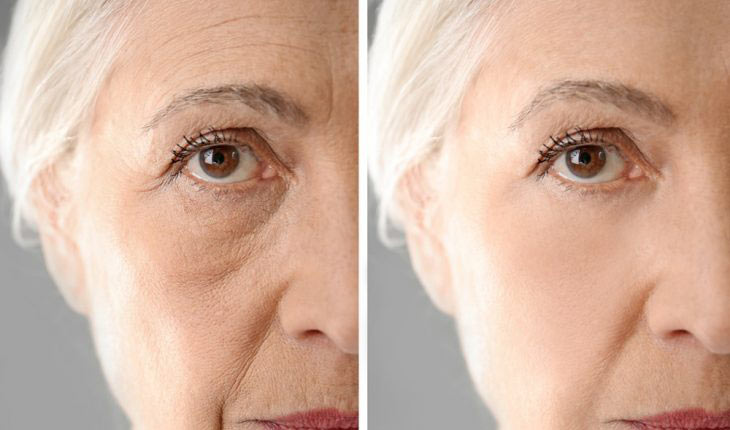
V primeru, da kolagen uživate z namenom zmanjšanja težav s sklepi, so lahko rezultati in učinki nekoliko oddaljeni. Te težave namreč zahtevajo res dolgoročno uživanje kolagena, da bodo učinki občutni. Pri tem, kako hitro bodo vidni rezultati uživanja kolagena je odvisno tudi od številnih drugih dejavnikov. Zelo pomemben dejavnik je odmerek zaužitega dodanega kolagena, o katerem smo več govorili zgoraj. Pomembno je tudi, da ste pri uživanju prehranskega dopolnila konsistentni in vzdržujete redno uživanje kolagena.
Če boste kolagen uživali le občasno, ali ste se odločili, da je za vaše potrebe dovolj le polovični odmerek, lahko traja nekaj časa dlje, da boste opazili začetne rezultate delovanja kolagena na organizem.Da bi omogočili kolagenu, da izrazi svoje učinke, je pomembno, da se držite tudi zdrave in uravnotežene prehrane. Svetujemo vam prehrano, ki vsebuje polnovredna živila, je bogata z vitamini in minerali ter ostalimi pomembnimi hranili.
Pomembno vlogo pri izražanju učinkov lahko določa tudi vaša starost. Predvsem zato, ker starost običajno pogojuje prvotno količino kolagena v vaših zalogah, ter količino kolagena, ki ga samostojno proizvede vaše telo. Na učinke kolagena pa lahko vpliva tudi vaše zdravstveno stanje. Če imate katero od avtoimunih boleznih, ki ovirajo proizvodnjo kolagena, se pred pričetkom uživanja dopolnil, obvezno posvetujte z vašim zdravnikom.
Znanstvene študije o kolagenu
Narejena je bila študija z vključenimi 73 športniki, ki so kar 24 tednov redno uživali 10 gramov kolagena dnevno. Zaznali so občutno zmanjšanje bolečin v sklepih med samo hojo, kot tudi med mirovanjem, v primerjavi s skupino, ki kolagena ni dodajala prehrani. Z drugo študijo, kjer so odrasli 70 dni uživali po 2 grama kolagena na dan, so pokazali, da se je znatno zmanjšala bolečina v sklepih in da so se osebe lažje gibale, glede na tiste osebe, ki kolagena niso uživale.
Video: vrhunski vir kolagena, ki izhaja iz kostnega mozga ima vpliv na stanje sklepnega hrustanca.

To so dokazale tudi številne študije.Nekateri raziskovalci so sicer ugotavljali, da bi se lahko dodaten kolagen kopičil v hrustancu in spodbujal vaše tkivo, da tvori kolagen. To bi načeloma lahko privedlo do manjšega vnetja, boljše podpore sklepom ter posledične zmanjšane bolečine.
Študije kažejo, da je potrebno v začetni fazi uživati odmerek kolagena od 8 do 12 gramov. Eden izmed učinkov kolagena vpliva tudi na izgubo kosti. Kosti so v večini oblikovane iz kolagena, ki poskrbi za strukturo in omogoča, da so kosti močne. Znano je, da se z leti slabša tudi kostna masa, ne samo količina prisotnega kolagena v telesu. Kombinacija obeh zmanjšanj pa lahko privede do bolezni, najpogosteje pride do osteoporoze, ta pa lahko privede do povečanega tveganja za zlome kosti.
Študije kažejo, da lahko kolagen v obliko dodatkov prispeva k posameznim učinkom, ki pomagajo zavirati razgradnjo kosti, ki bi lahko tvorila do osteoporoze. Študija, ki je trajala 12 mesecev je pokazala, da so ženske z dnevnim dodajanjem kalcija v kombinaciji s 5 grami kolagena imele v krvi nižje ravni beljakovin v krvi, ki spodbujajo razgradnjo kosti, v primerjavi s tistimi, ki so uživale zgolj kalcij. Z neko drugo študijo so ugotovili, da se je pri ženskah, ki so 12 mesecev uživale 5 gramov kolagena na dan, do 7% povečala mineralna gostota kosi, v primerjavi s tistimi, ki kolagena niso uživale.
Te študije sicer nakazujejo na določen vpliv kolagena, vendar je potrebno za posebne učinke kolagena na kosti izvesti še več študij.Prepoznani so tudi učinki kolagena na povečanje mišične mase. Kar do 10% mišičnega tkiva je sestavljenega iz kolagena. To je še en dokaz več, da je kolagen res pomemben za naš organizem. Pomaga namreč našim mišicam, da ohranijo moč in da delujejo pravilno.Dodatki s kolagenom lahko, glede na že narejene študije, prispevajo k povečanju mišične mase pri tistih, ki imajo sarkopenijo, izgubo mišične mase, ki nastane kot posledica starosti.
S študijo, v kateri je sodelovalo 27 moških, ki so 12 tednov sodelovali v vadbenem programu in dnevno uživali 15 gramov kolagena, so pokazali, da so v enakem obdobju pridobili več mišične mase in moči kot tisti, ki niso med vadbenim programom uživali še dodatka s kolagenov. V študiji leta 2019 so ugotovili, da se pri rekreativno aktivnih moških, povečala mišična masa, ob kombinaciji dodatkov peptidov kolagena ter treninga moči. Dodajanje dodatkov kolagena so preučevali tudi leta 2017 na miših z posttravmatskim osteoartritisom. Ugotovili so, da ima lahko dodatek zaščitno vlogo pri razvoju in napredovanju bolezni.
Strokovnjaki menijo, da bi lahko z uživanjem dodatnega kolagena spodbudili sintezo mišičnih beljakovin, kot je kreatin, hkrati pa bi lahko spodbudili tudi rast mišic po vadbi. Da bi natančno opredelili potencial kolagena na povečanje mišične mase, je potrebno izvesti več dodatnih raziskav.Kolagen prispeva tudi k zdravju srca.
Znanstveniki domnevajo, da uživanje dodatka s kolagenom lahko pomaga zmanjšati tveganje za srčno obolenje. Ta izredno pomembna beljakovina namreč prispeva tudi k strukturi vaših arterij, ki so krvne žile, ki prenašajo kri iz srca v preostale dele srca. Ko se količina beljakovin zmanjša, lahko arterije postanejo šibke ter krhke. To stanje pa lahko privede do resnih težav.5. v študiji, kjer je 31 zdravih odraslih oseb, kar pol leta uživali 16 gramov kolagena.
Po koncu se je opazila manjša togost arterij, v primerjavi z obdobjem, predno so pričeli z dodajanjem kolagena. Hkrati pa se je izboljšala tudi raven »dobrega« holesterola, ki je pomemben dejavnik pri boleznih srca. Da pa bi lahko z gotovostjo trdili, da kolagen vpliva na zdravje srca, je potrebno izvesti še dodatne študije.Obstaja pa seveda še veliko drugih koristi za zdravje, ki do danes še niso bile podrobno preučevane, vendar so o njih poročali številni uporabniki, ki redno uživajo kolagen.
Veliko jih priča o boljši moči nohtov, saj naj bi kolagen preprečeval krhkost. Ob tem so nekateri zaznali, da kolagen spodbudi tudi lase in nohte, da ti hitreje rastejo. V krogih alternativne medicine, se kolagen svetuje tudi pri sindromu puščajočega črevesja.Znanstvenih dokazov, da bi kolagen prispeval k podpori delovanju črevesja sicer ni znanstveno dokazano, vendar številni uporabniki zaznavajo pozitiven učinek kolagena ob teh težavah.
Nekateri priporočajo kolagen tudi kot hranilo, ki prispeva k zdravju možganov. Sicer to s študijami ni potrjeno, vendar nekateri trdijo, da prispevajo k razpoloženju in lahko zmanjšajo simptome tesnobe. Uporabniki verjamejo, da kolagen prispeva tudi k izgubi teže. Kljub pomanjkanju študij, naj bi zaznali hitrejše delovanje metabolizma. Za vse te trditve pa je seveda potrebno počakati prave dokaze znanstvenikov.
Pogosta vprašanja in odgovori
V nadaljevanju odgovarjamo na najbolj pogosta vprašanja, vezana na kolagen.
Kaj je kolagen?
Kolagen je beljakovina, ki jo najdemo po vsem telesu, zlasti v koži, kosteh, ligamentih, kitah, v zobeh in vezivnem tkivu.
Kaj je kolagen (enostavneje)?
Kolagen je beljakovina, ki ohranja vaše kosti močne in omogoča, da se vaša koža raztegne in zaceli po poškodbah. Beseda izvira iz grškega korena, kolla, kar pomeni "lepilo". Večina kolagena se nahaja v vezivnem tkivu med kostnimi celicami; njegova izguba lahko povzroči bolečine v sklepih.
Je kolagen res dober za vas?
Kot vir beljakovin je kolagen odličen, saj vsebuje več beljakovin na kalorijo kot nekateri drugi viri, medtem pa vsebuje tudi manj natrija in sladkorja. Obstajajo namreč tudi dokazi, ki kažejo, da lahko izboljša telesno sestavo, zdravje sklepov in hitrost celjenja morebitnih ran.[1]
Katera živila vsebujejo kolagen?
Viri kolagena v hrani so predvsem sledeči: ribe, piščanec, beljaki, citrusi, jagode, rdeča in rumena zelenjava, česen in beli čaj.[2]
Ali lahko 14-letnik jemlje kolagen?
Da, izdelki iz kolagenskih beljakovin v prahu so varni tudi za najstnike, stare od 13 do 19 let.
Ali zaradi kolagena veliko urinirate?
Kolagen vsebuje aminokislino hidroksiprolin.Tako kot druge vrste živalskih beljakovin kolagen vsebuje vrsto aminokisline, imenovano hidroksiprolin. To je aminokislina, ki se v telesu pretvori v oksalat, kar lahko poveča raven izločanja oksalata v urinu in nasploh urin sam.
Ali je slabo jemati kolagen vsak dan?
Ali lahko odmerite preveč kolagena? Kolagen na splošno velja za varen in netoksičen dnevni dodatek za zdrave posameznike in večina ljudi ne bo nikoli doživela neželenih stranskih učinkov.
Ali kolagen zgosti lase?
Lahko kolagen zgosti lase? Kolagen pomaga zgostiti lase, tako da se bori proti poškodbam foliklov, preprečuje starostno redčenje in zagotavlja gradnike, ki sestavljajo lase.
Kaj naredi kolagen za obraz?
Trženje kolagenskih izdelkov se izvaja predvsem z namenom, da se izboljša elastičnost kože, zmanjša vidne gube in poveča pretok krvi v kožoi "Kolagen je tisto, kar preprečuje, da bi naša koža povešena, in daje tisti napet, mladosten videz.
Katero sadje vsebuje kolagen?
Citrusi.Vitamin C ima pomembno vlogo pri proizvodnji pro-kolagena, predhodnika kolagena, zato je zaužitje dovolj vitamina C ključnega pomena. Kot verjetno veste, so citrusi, kot so pomaranče, grenivke, limone in limete, polni tega hranila.
Koliko kolagena naj vzamem na dan?
Uradnih smernic o tem, koliko kolagena je treba zaužiti na dan, ni. Na splošno lahko za izboljšanje zdravja kože in las peroralno jemljete 2,5-10 gramov kolagenskih peptidov 8-12 tednov na dan. Pri artritisu lahko vzamete 10 gramov kolagenskih peptidov na dan v 1-2 deljenih odmerkih približno 5 mesecev.
Kakšni so stranski učinki jemanja kolagena?
Uživanje kolagena lahko v redkih primerih povzroči prebavne težave, kot denimo zgaga in občutek polnosti. Ne glede na to se zdi, da so ti dodatki varni za večino ljudi. Dodatki kolagena lahko povzročijo blage stranske učinke, kot so napihnjenost, zgaga in občutek polnosti.
Ali je kolagen varen za jemanje?
Raziskave kažejo, da je dodajanje kolagena varen in učinkovit način za izboljšanje zdravja kože in sklepov. Toda, kot pri vsakem dodatku, je najbolje biti previden. Uprava za hrano ne ureja in ne nadzoruje prehranskih dodatkov, zaradi česar je nemogoče vedeti, ali se dodatek ujema s tem, kar je na etiketi.
Pri kateri starosti naj ženska začne jemati kolagen?
Na splošno je miselno, da začnete jemati kolagen med 20. in 30. letom starosti. Naravna proizvodnja kolagena v telesu se začne zmanjševati okoli 30. leta starosti, vendar bi lahko dodajanje kolagena imelo dodatne koristi na izgled vaše kože.
Kaj se zgodi, ko prenehate jemanje kolagena?
Ko prenehate jemati kolagenske peptide, vaše telo izgubi dodaten vir beljakovin, ki proizvajajo elastin. Kot si lahko predstavljate, vaše kožne celice v obdobju po 30. letu proizvajajo manj elastinskih vlaken, kar povzroča viden upad elastičnosti kože.
Kdo potrebuje kolagen?
Kolagen je beljakovina, ki je odgovorna za zdrave sklepe in elastičnost oziroma raztegljivost kože. Nahaja se v vaših kosteh, mišicah in krvi ter obsega kar tri četrtine volumna vaše kože in kar tretjino beljakovin v telesu. Ko se starate, se vaš obstoječi kolagen razgradi, proizvodnja tega proteina je vse težja.
Ali je kolagen škodljiv za ledvice?
Bi se morali izogibati kolagenu? Na splošno se kolagenski dodatki ne priporočajo za tiste, ki imajo visoko tveganje za nastanek ledvičnih kamnov. Kljub temu je malo verjetno, da bi zmerno uživanje kolagena kot del zdrave prehrane povzročilo nastajanje ledvičnih kamnov.
Ali lahko kolagen povzroči povečanje telesne mase?
Kolagen ne bo povzročil povečanja telesne mase. Povečanje telesne teže je posledica zaužitja več kalorij, kot jih porabite. Kolagen ne vsebuje pretirane količine kalorij. Pravzaprav MojoMe goveji kolagen vsebuje le 36 kalorij na 10 g.
Kaj je bolje: kolagen ali biotin?
Biotin lahko spodbudi rast las, lajšadermatitis in okrepi nohte. Kolagen pa lahko pomaga v boju proti gubam in zmanjšanju celulita, kolagen pa lahko spodbudi tudi rast las.
Ali lahko kolagen obarva SIVE lase?
Kolagen lahko pomaga zmanjšati videz sivih las, tako da podpira zdravo strukturo lasnega mešička (kjer nastaja pigment, ki daje lasem barvo). Ko se kolagenske kreme ali geli nanašajo neposredno na lasišče, so lahko sivi lasje temnejši in tudi manj suhi. Tekoča prehranska dopolnila s kolagenom na splošno veljajo za varna, če se uporablja v skladu z navodili. Opozoriti je potrebno, da prehranskih dodatkov ne ureja FDA, kar pomeni, da niso testirani glede varnosti uporabe.
Izbira dodatka, ki ga je preverila tretja oseba, kot je USP, lahko vsaj zagotovi, da izdelek vsebuje odmerek, kot je naveden.Prehranska dopolnila sunwarrior - ali je kolagen v teh konkretnih dopolnilih varen za uporabo?Vse sestavine v izdelkih Sunwarrior veljajo za varne v količinah, ki jih najdemo v živilih samih. Vedno uporabljajte Sunwarrior dodatke zmerno in upoštevajte priporočeno uporabo, ki je navedena na etiketah.
Ali kolagen beli kožo?
Kolagen deluje bolj pri odpravljanju težav, ki so v osnovi kože. Pri odpravljanjem težav s kožo, kot so akne, vam lahko pomaga zagotoviti sijočo kožo. Za posvetlitev vaše kože je pomembna tudi vaša prehrana, vendar je prav tako še bolj pomembna vaša osnovna nega kože.
Vas kolagen naredi zaspane?
Presenetljiva korist jemanja kolagena je pozitiven vpliv, ki ga lahko ima na vaš spanec. To je zato, ker je kolagen napolnjen z aminokislino glicinom, zaviralnim nevrotransmiterjem, ki pomirja osrednji živčni sistem in nam pomaga, da se sprostimo in lažje zaspimo.ZaključekKolagen je zelo pomembna beljakovina, ki posameznim delom telesa zagotavlja strukturo.
Zanimivo spoznanje je, da hrana, ki jo uživamo, pogosto pomaga telesu, da tvori pomembne beljakovine. Kot dodatek pa se lahko tudi neposredno uživa kolagen. Uživanje kolagena je povezano z različnimi koristmi za zdravje, na drugi strani pa je raziskanih zelo malo tveganj.Po kolagenu lahko posežete, če si želite lepše kože, manj suhosti in zmanjšanih gub.
Kot ugotavljajo uporabniki, lahko kolagen prispeva tudi k povečanju mišične mase ter prepreči slabo stanje kosti ter olajša bolečino v sklepih. Prepričajte se, če bo kolagen podobno kot na dosedanje uporabnike, učinkoval tudi na vas.Kljub temu, da smo predstavili nekaj živil, ki so bolj bogata s kolagenom, se vedno več ljudi odloča za dodatke s kolagenom, saj ti nudijo predvsem bolj enostavno uživanje te zelo pomembne beljakovine. Na splošno, so kolagenski dodatki povsem varni za uporabo, vedno več pa jih ima tudi prijeten okus, ki popolnoma zakrije okus kolagena.
Viri in reference
Vir: Družinski zdravstveni vodnik. Konvencionalno in alternativno zdravljenje
1. Are There Benefits to Collagen Supplements? - https://www.nytimes.com/2019/11/09/style/self-care/collagen-benefits.html
2. Best Collagen Sources: List Of Foods With High Collagen - https://www.naturemade.com/blogs/health-articles/collagen-sources

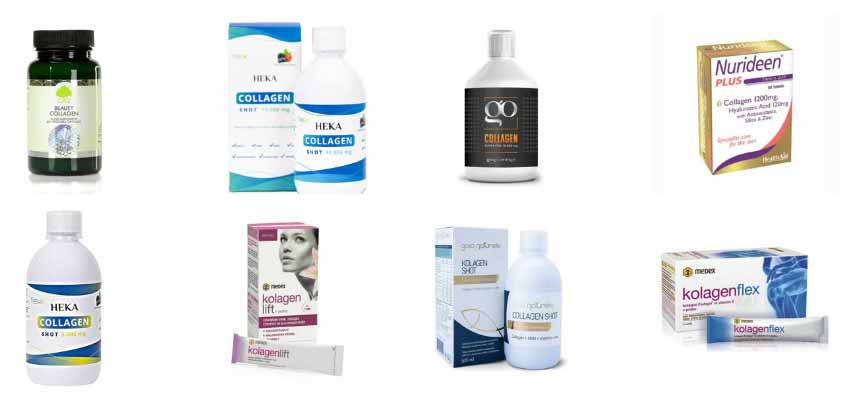


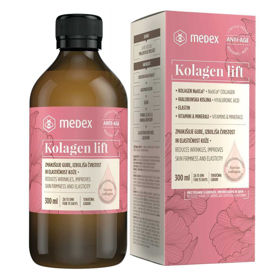
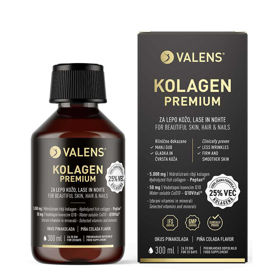




 Facebook
Facebook
 Instagram
Instagram
 info@moja-lekarna.com
info@moja-lekarna.com

